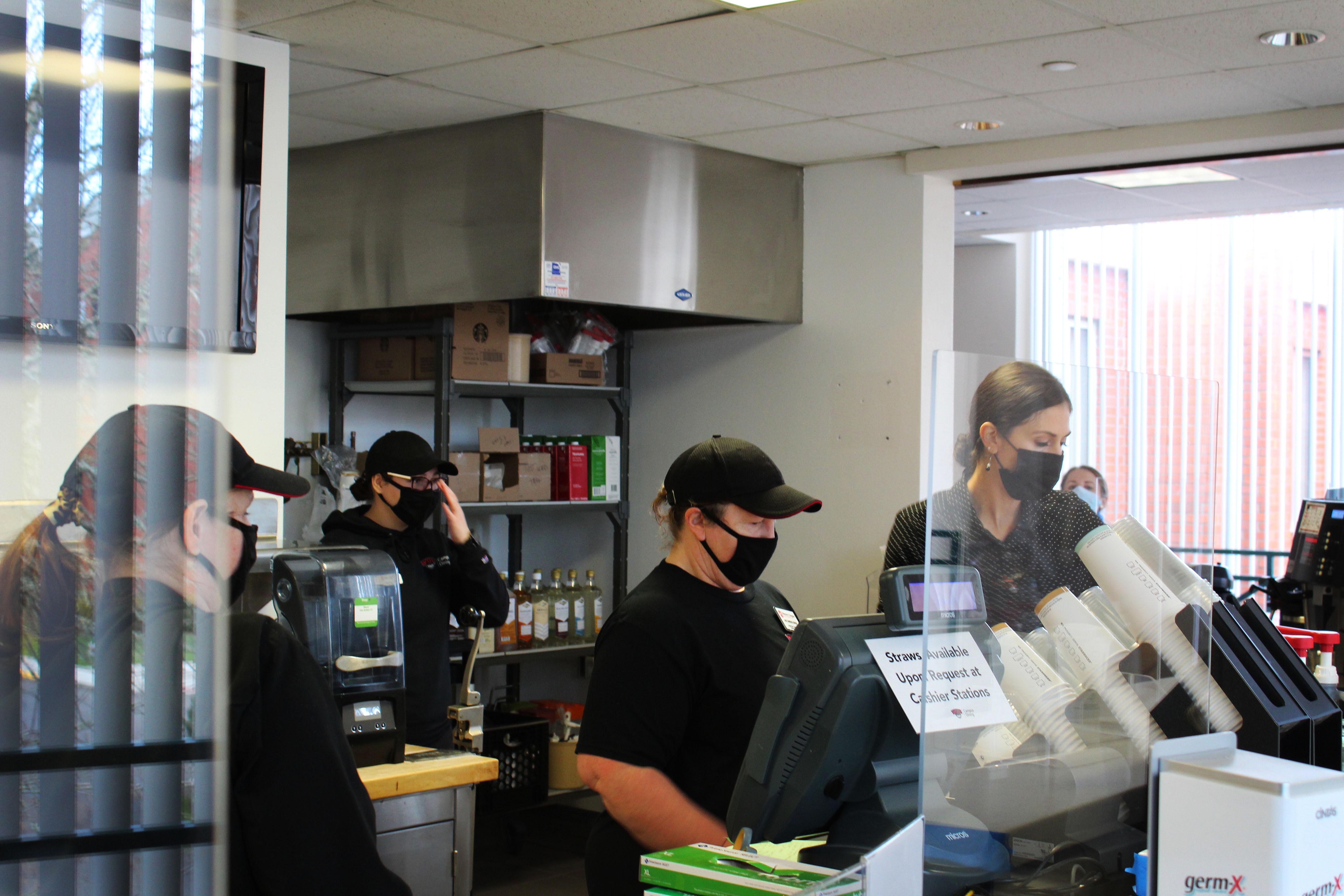Written by: Gretchen Sims | Editor-In-Chief Hannah Field | News Editor
Western has been a key leader among Oregon Public Universities when it comes to sustainability practices. Ackerman Hall, as one example, was not only built to be sustained by solar power — Ackerman has two types of solar panels that reduce its residents’ energy consumption by 35 percent — but goes so far as to have a built-in, 30,000-gallon tank to harvest rainwater, reducing 50 percent of potable water usage by flushing toilets.
More recently, Western saw the implementation of the ReWOUsable To-Go Container program which has helped limit excess waste of to-go boxes. Additionally, Campus Dining has a Sustainable Dining Program that works to decrease its carbon footprint by buying from local vendors to support small businesses and sustainable practices, decreasing transportation costs, when possible, and opting to compost over throwing out leftover food.
University Housing has also moved to establish a comprehensive recycling program to decrease Western’s carbon footprint further.
However, Western has not always had a history of supporting calls of action for climate change or sustainability, whether coming from within the house — students, staff and faculty — or community members.
In 2014, Mark Van Steeter, a current Sustainability Professor but Geography Professor at the time, encouraged Western to take a step further in the fight against climate change and pushed to further its sustainability progressivism. Van Steeter began advocating for divestment from fossil fuels, alongside the Environmental Club on campus.
“Unlikely, but you may ask ‘why divest from fossil fuels?’ The reason is that industry must adapt rapidly to a lower carbon energy source in order to remain profitable and contain the potentially disastrous consequences of global warming. The science is extraordinarily clear. A warmer planet is not inherently a problem, the problem is that we have based industrialized society on the assumption of a stable climate and now our population numbers which increase by a quarter of a million a day cannot be sustained if significant climate disruptions continue and grow,” Van Steeter said in an email to Tommy Love and Former Western President Mark Weiss, Sept. 22, 2014.
The day after Van Steeter reached out to Love and Weiss, an email was sent out to students and staff that read:
“I believe it may be time to start a campaign at (Western). Since we are a small university with
minimal ties to the fossil fuel industry, it may be an easy statement for us to make regarding our
vision and integrity. It is an opportunity to give (Western) public attention regarding our investment in a prosperous future for our students.”
On Oct. 9, Van Steeter began to receive pushback for his persistence in the divestment plan. This was said in an email from James Baumgartner, the Chair of the WOU Foundation at that time:
“However, it is not appropriate, nor can I see it as anything other than a strategy to agitate, for you to make inquiries directly to the (WOU) Foundation’s investment advisor. No such firm would make disclosures about its client’s investments to random public inquiries, nor should they, and I can’t imagine me ever asking your advisors or PE(E)RS for your investment information (much less, expect them to provide it)… I will give your request appropriate consideration. However, at this point, the Foundation has decided it will not actively pursue a fossil fuel divestment policy.”
After these email exchanges, both a student and Western Alumni requested to present before the WOU Foundation concerning the divestment, but both were denied.
On Nov. 13, 2014, Weiss divulged in an op-ed article for the Statesman Journal that, while climate change needs immediate action, divestment was not the solution. Van Steeter responded Nov. 19, also via an Opinion piece in the Statesman Journal, urging Weiss to divest.
A few days later, Nov. 22, student activists collected over 250 peer signatures in support of divestment.
The Foundation responded to pressure from students and staff by conducting a hearing Jan. 9, 2015, with Baumgartner and Tommy Love, executive director of the Office of University Advancement and WOU Foundation at that time. Former Western student, Beth Bello, was in attendance at this meeting. Bello founded the Environmental Club in the fall of 2014 and acted as president until she graduated in the spring of 2016.
Both Van Steeter and Bello reported that, in this meeting, Baumgartner informed the group that he was a paid lawyer for Tar Sands Oil extraction from Canada and the Keystone Pipeline. He then went on to tell the divestment group that fossil fuel divestment would not be on the Foundation’s meeting agenda due to an incomplete proposal.
Van Steeter attests that “All information regarding questions was provided, but not in the appropriate format.”
Baumgartner recommended the divestment advocates present before the Planned Giving and Finance Committee of the Foundation which, if found favorable, could land them back on the agenda.
The Western Howl, known at that time as the Western Oregon Journal, reported on previous meetings discussing divestment in Nov. of 2014. “…in attendance at the meeting was Tommy Love, executive director in the Office of University Advancement and WOU Foundation. Love said divesting is a complicated issue and the foundation wants to make sure they do what’s right,” wrote Laura Knudson, a former Editor-In-Chief.
Also in that article, Love reportedly said, “‘I don’t want students to think that the foundation and myself do not recognize the issue of climate change…’ Divesting is ‘one way to do it, but let’s have a campus-wide conversation to address global climate change.’”
“Unfortunately, I am not surprised that (Western)’s Board has chosen to ignore student voices and undeniable scientific evidence on the issue of climate change. During our meeting with the board in January of 2015, the chair of the WOU Foundation, Jim Baumgartner, revealed that he was a paid lawyer for Tar Sands Oil extraction from Canada and the Keystone Pipeline. He made it abundantly clear that he was worried about his personal investments and had no intention of voting to divest due to this conflict of interest. I think the entire divestment team lost hope at his words,” said Bello.
Bello is now a teacher at North Salem High School and teaches AP Human Geography, following in Van Steeter’s footsteps.
“At the time of our meeting, (Western)’s mission statement included the assertion that (Western) ‘Continuously improves our educational, financial, and environmental sustainability.’ One of our main arguments in the divestment campaign was that (Western)’s board was not living up to its mission statement. Nine years later, the university has removed all mention of environmental sustainability and global citizenship. I have to admit, I think it’s because they realized we were right,” said Bello.
While the Board meeting did not end in the divestment group’s favor, Bello still managed to take something away from the experience.
“In a way, the board’s decision not to divest from fossil fuels has empowered me. It took time, but it helped me to understand the terrible cost of human greed and how insignificant my efforts were in combating that. If we had gotten what we wanted, I might have thought that creating change is easy — all you have to do is collect signatures and wave signs and point out hypocrisy — but that’s not true. Change has to come from the top. Only constant economic pressure from citizens will force governments and industries into changing,” said Bello.
This meeting was not wholly unsuccessful for those in favor of Western’s divestment from fossil fuels.
A Socially Responsible Fund was established in 2016, which promised a divestment from fossil fuels when the fund reached $20,000.
“(The WOU Foundation) did make a fund that does not invest in fossil fuels or tobacco, but to my knowledge, it’s just sitting there with a small amount of money in it. And not promoted at all,” Van Steeter said.
Van Steeter, himself, donated to the fund alongside a small group of colleagues however, no changes have been spotted in regards to the promotion of the Socially Responsible Fund from 2016, the same fund that Mark and two other colleagues donated to close to eight years ago.
“On the divestment scene, I submitted to the faculty senate (a proposal) and the faculty senate passed it, approved it. But the faculty senate is simply an advisory body. And the foundation, more or less, kept telling me to get lost and would agree to meet with students, but then basically do nothing. It was a pretty interesting experience seeing how you can play like you’re acting with integrity, but you aren’t… It was a little humbling,” said Van Steeter.
More recently, a member of the Monmouth-Independence Climate Task Force, a community group, approached Western with an idea that could both make the campus more sustainable and save the the college money — all at little or no cost due to federal funding from the Inflation Reduction Act One task force member, Skip Wenz writes a column for several newspapers in the Willamette Valley titled “Your Ecological House.” While this column first started as a sustainable home renovation guide, it has now turned into a discussion about climate change.
Wenz also was the founder and Director of the Ecological Design Program at the San Francisco Institute of Architecture, and has worked in the sustainability field for several decades.
Wenz first met solar expert, Dan Orzech of the Oregon Clean Power Cooperative, at a church in Salem that had recently installed solar panels — Orzech led this project, as well as a project to install solar panels at Oregon State University.
In 2022, President Joseph Biden signed the IRA, providing major tax incentives for not-for-profit institutions to switch to clean energy. Wenz thought that this might be a good opportunity for Western.
“He and I, and a couple of members of our little group actually scoped out a map, a Google map, of the campus online. And he had a couple of ideas of where, you know, just from looking at the map, where some (solar panels might go),” Wenz said.
It was around this time when Wenz began to correspond with Western’s Current President, Jesse Peters. Wenz pitched an IRA funded solar panel installation idea to Peters.
“He gave me the name of somebody there that he wanted me to write, who I did write two or three times and never heard back from,” Wenz said.
“I’m not sure what, if anything, could happen (because of The Inflation Reduction Act). From what I know, the best way for this college to get its hands on federal money (is) to do more solar stuff. (Western could) hire (Orzech) as a consultant to plan a solar installation with IRA funding, because he’s an expert and he’s done it on several (occasions). Western Oregon is qualified, it’s a type of institution that they specifically designed this money to go to,” said Wenz.
After not getting a response to his numerous emails, Wenz stopped pushing.
“I didn’t wanna push too hard because I didn’t wanna alienate anybody, especially Jesse Peters… he did what a good administrator does, which is, send me to somebody else… And for all I know, you know, somebody over there is already working on it, but I haven’t heard anything about it,” Wenz said.
Sustainable practices are usually associated with climate change, but there would be other benefits that Western could gain by switching to a local power source such as solar panels.
“If you are replacing a consumable, like electricity, that you are buying from someone else, with what we could call capital expenses, which is equipment you buy once, and then you can use it for 20 years, you’re stabilizing the costs of the power you generate, and so the fluctuations in the electricity market won’t affect you as drastically. If you either set it up as a microgrid to be independent from the larger grid, or you add local storage, you buy resiliency in the case of natural disasters,” said Stephen Howard, a member of the Monmouth-Independence Climate Task Force.
Howard’s interest in climate issues began when he was a student studying architecture — which led to an interest in urban design. During his nearly 25 years in the industry, Howard has learned that “…a lot of the solutions, certainly not all of them, but many solutions, to the climate (are) in the urban design space, in terms of how our buildings are built and how we access services and work and school. Where you live and how it’s developed (has) a lot to do with your personal carbon footprint, more than what you choose to buy or what you own.”
Howard mentioned that the Monmouth-Independence community that surrounds Western would also benefit from the university generating its own electricity with the installation of solar panels.
“This is an indirect benefit to Western, but the amount of electricity that our community pulls from Bonneville, we pay a certain rate, a wholesale rate to Bonneville, and as the amount of electricity our community demands goes up, we will eventually hit a higher tier price for that electricity, so the more electricity we generate locally, the more we push off that date of having to pay more for our power. So whether it’s Western, or the local governments, or the school district, or individual homeowners, the more local power we generate, the cheaper we keep our electricity,” Howard said.
Upon contacting President Peters for a comment, he offered one statement and redirected the rest of his questions to the Director of Marketing and Communications, Maureen Brakke, who also acts as the Public Information Officer for Western.
“Though it can be a slow and difficult process, (Western) has taken steps over the years to address sustainability. This is particularly important in a time of rapidly changing climate, and even small actions can make a difference. I have no doubt that the students and employees in our community will continue to find ways to be part of the solution,” Peters said.
Brakke commented on some ways Western Students have previously practiced sustainability. “Prior to the COVID-19 pandemic, (Western)’s residence halls had a Green Team whose purpose was to implement and coordinate the residence hall recycling program which included collection and maintenance of centralized recycling locations throughout the residence halls. Additionally, they provided educational programming that increased environmental and sustainability awareness within the residence halls. This program isn’t currently active but it is a sustainability initiative that they plan to bring back soon,” said Brakke.
It has yet to be seen who is in charge of the initiative or when it will be revived.
“Regarding your foundation investment question, the WOU Foundation Board established a Socially Responsible Fund in 2016, and we will continue to seek growth in that account. The leadership at the Foundation has changed a lot since then, but we are exploring new ways to promote and grow the fund,” Brakke said.
The WOU Foundation did not respond to Van Steeter’s emails or calls in his effort to provide accurate, up-to-date information regarding the fund.
“We hope to continue to make ongoing improvements to reducing, reusing and recycling on campus, and become more energy efficient, looking at using more efficient appliances, lighting, etc. Our community is also engaged in more walking, biking, carpooling and using our local Trolley, we encourage our community to continue to utilize these more environmentally friendly modes of transportation when possible. We also actively plant new trees where we have to remove trees on campus. As a public university, we follow Oregon state laws and policies regarding environmental regulation,” said Brakke.
In the end, it’s important to foster open, productive conversations about climate change. It’s easy to advocate for climate change by sounding alarms about the negative consequences of not taking action, but “…that’s really only half the conversation. We need to spend at least as much effort imagining how much better things will be when we get this right,” said Howard.
“I think as much as we need the warnings of what could go wrong, we also need something to look forward to. And without both, I think it’s a lot harder to get people on board, avoiding something that seems sort of nebulous and negative versus having a goal to reach for. And so I would encourage the campus, whether it’s the student body, or the staff and faculty, or everybody combined, to really think about the positives and what we could have if we put the work in now to build a better future,” Howard continued.
“For a while, losing the fight for divestment made me feel hopeless, but I don’t feel that way anymore. It taught me about the insidious and pervasive reach of the oil industry. The whole experience taught me that I have a voice that can be used for change, and even if that change doesn’t happen overnight, I am one of countless people that will collectively use our voices to transform the world,” said Bello.
“I’m not saying that we should throw all our money into sustainability and then have the rest of the university collapse,” said Van Steeter. “But we need to start putting it on the agenda whenever we’re making decisions… I would love to have Western be this icon of a small public university that focuses on sustainability and offers these really high-quality programs with small class sizes. We have all the tools to do that — (Western is) really just beautiful.”
Van Steeter remains hopeful that someday the college will divest from fossil fuels.
Contact the authors at howleditorinchief@wou.edu and howlnews@wou.edu






